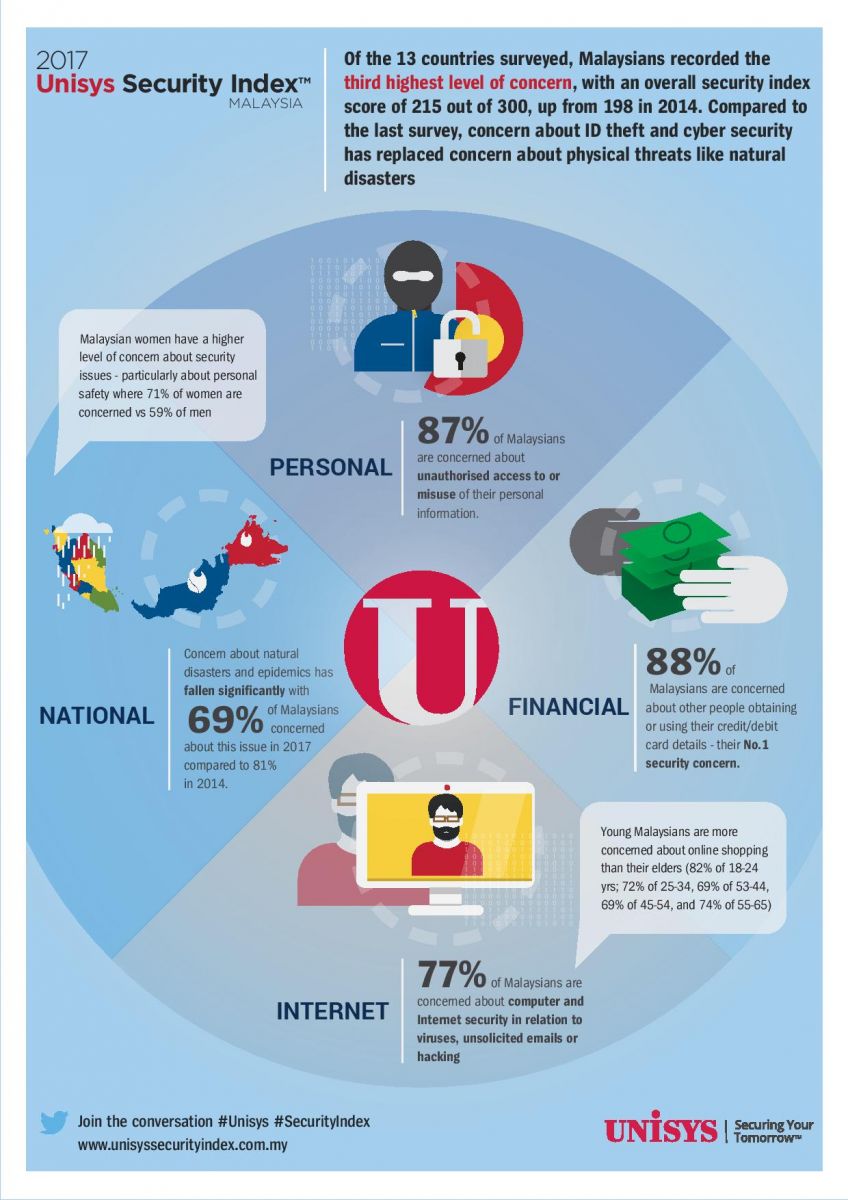Malaysians’ concern about cyber security issues escalates: Unisys Security Index
By Digital News Asia July 27, 2017
- Concern about ID theft and cyber security overtakes concern about physical threats
- Malaysia recorded the third highest level of concern of the 13 countries surveyed
%20with%20CyberSecurity%20Malaysia%20CEO%20Amirudin%20Abdul%20Wahab.jpg)
THE Malaysian public’s concern about security issues is the highest it has been in the last decade with concern about identity theft and cybersecurity overtaking previous concerns about physical threats – according to the 2017 Unisys Security Index.
The overall Unisys Security Index for Malaysia is 215 on a scale of 0 to 300, up from 198 recorded in the last survey in 2014, and the highest index since the research was first conducted in Malaysia in 2008.
Malaysia recorded the third highest level of concern of the 13 countries surveyed and is 42 points (24%) higher than the global average.
The Unisys Security Index is a global study that gauges the attitudes of consumers on a wide range of issues related to national, personal, financial and Internet security.
The study polled 1,000 adults in Malaysia during April 2017. The 13 countries surveyed are Argentina, Australia, Belgium, Brazil, Colombia, Germany, Malaysia, Mexico, the Netherlands, New Zealand, Philippines, the UK and US.
The top three areas of security concern for Malaysians are:
- Bank Card Fraud: 88% of Malaysians are concerned about other people obtaining or using their credit/debit card details.
- Identity Theft: 87% of Malaysians are concerned about unauthorised access to, or misuse of, personal information.
- Viruses/Hacking: 77% of Malaysians are concerned about computer and Internet security in relation to viruses, unsolicited emails or hacking.
“The high concern about identity and cyber issues is a significant change from the last survey in 2014 when the top security concerns for Malaysians were personal safety, the threat of war or terrorism and natural disasters such an epidemics or floods. The previous concern about physical threats has shifted to concern about cyber and data-based threats,” said Gaurav Gupta, director for security programs, Unisys Asia.
“Consumers’ fears reflect the very real threat that their personal details may be stolen and sold on the dark web – whether they are tricked into providing their details themselves via phishing scams, or the organisations they deal with suffer data breaches.
“To build consumer trust, organisations that collect and use Malaysian consumer data need to show that they employ robust cyber resiliency frameworks to safeguard the data in their care from both malicious and accidental data breach threats,” Gupta said.
Amirudin Abdul Wahab, CEO of CyberSecurity Malaysia, the national cyber security specialist and technical agency said: “The Malaysian public’s concern about identity and cyber security is part of the economic and national security challenges created by a world where we increasingly conduct our lives online, eroding national borders. But the good news is that being aware of the threats is the first step to securing ourselves against them.
“That is why CyberSecurity Malaysia provides a number of proactive services to educate the public about online safety, and encourage fast reporting and response to data breaches via the Cyber999 help centre.”
The research study also looks at the Malaysian public’s willingness to share personal data with organisations via data analytics and the Internet of Things (IoT) – where devices can share information with other devices or systems via the Internet.
The findings suggest that Malaysians want control over when they share their information. Key findings include:
- The vast majority of Malaysians, 91%, support using a button on their smart phones or smartwatches to alert police to their location during emergencies. In contrast, only 37% of Malaysians support police being able to monitor fitness tracker location data at any time.
- Approximately three in four Malaysians (77%) support medical devices such as pace makers or blood sugar sensors automatically transmitting significant changes to a patient’s doctor. Yet only 45% of people support health insurers tracking fitness monitor data to determine premiums or reward healthy behaviour.
- The top reasons given by Malaysians for not wanting to share data with organisations via IOT devices is that they don’t want that organisation to have their data or that there is not a compelling enough reason to give the organisation such data.
- Only 36% of Malaysians support using an app on their smartwatches or smart phones to make payments, citing concern about data security as the top reason for not supporting this. However, 69% of Malaysians support fingerprint scans to control who can access data on their smartwatch, and 58% support finger print scans to authorise payments by their smartwatch suggesting that this may be a way to overcome data security concerns.
- Malaysians strongly support IoT and data analytics as a part of border security processes: 83% support police or border security staff wearing facial recognition body cameras to identify known criminals or terrorists; and 68% support border security officers in airports using data analytics to assess the travel history of passengers to determine if they are eligible for fast-track border clearance.
- However, there is low support for other government agencies accessing personal spending data from credit card records and insurance policies. Only 44% of Malaysians support welfare agencies using such data to verify claims, and even fewer, 38%, support the tax office using this data verify tax returns.
- There is also low support for banks analysing data collected about their customers from multiple sources to offer them targeted services and products – supported by only 39% of Malaysians.
“Consumers weigh up whether there is a compelling enough reason for an organisation to capture information about them – balancing privacy and the benefit being offered. The findings reveal law enforcement, national security and serious medical conditions are considered acceptable justification, but others are not. Government and commercial organisations need to take this into consideration and position their services accordingly if they want Malaysian consumers to take them up,” said Gupta.
Related Stories:
Malaysia Crime Prevention Foundation joins efforts to increase cyber security awareness
Cybercriminals targeting Mac users
The ever-evolving world of cyber security
For more technology news and the latest updates, follow us on Facebook,Twitter or LinkedIn.




